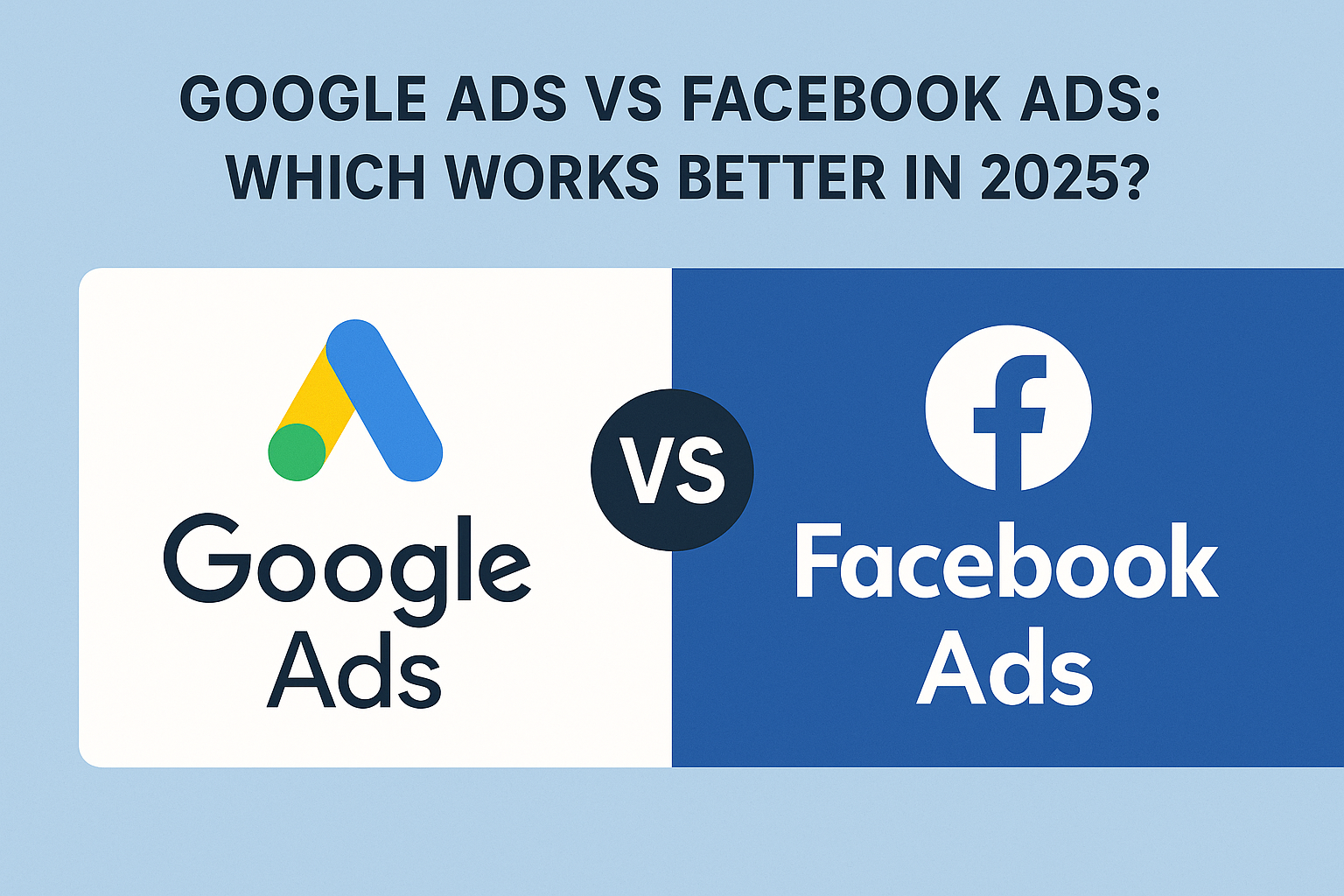Google Ads vs Facebook Ads: Which Works Better in 2025?

In 2025, businesses face an important question: Google Ads vs Facebook Ads—where should you invest your money? Both platforms dominate the online advertising world but work very differently. Google Ads captures people actively searching for products or services, while Facebook Ads allows you to target people based on their interests, behaviors, and demographics.
If you’re a beginner or a marketer aiming for growth, choosing between the two can feel overwhelming. The truth is, both platforms can deliver results, but the “better” option depends on your goals, audience, and budget. Let’s break it down step by step.
Why This Comparison Matters in 2025
The online marketing landscape is evolving rapidly. Here’s why this decision is more important than ever:
Rising ad costs: Both platforms have seen an increase in competition, which impacts CPC (Cost per Click).
Privacy changes: iOS updates and stricter data policies have affected tracking on Facebook.
AI-powered targeting: Google and Facebook now use AI to help advertisers reach the right audience faster.
Global reach: Businesses want cost-effective solutions that work across USA, UK, India, and worldwide.
Google Ads vs Facebook Ads: How They Work
Google Ads (Search + Display)
Google Ads is intent-driven. People type keywords into Google when they’re looking for solutions.
Strengths: High buyer intent, measurable ROI, great for local businesses.
Weaknesses: Competitive industries can be expensive.
Facebook Ads (Meta Ads)
Facebook Ads (including Instagram) is interest-driven. It helps you reach people who may not be searching but are open to discovering products.
Strengths: Excellent for brand awareness, visual storytelling, and niche targeting.
Weaknesses: Lower purchase intent, affected by privacy updates.
Step-by-Step Guide to Choosing Between Them
Step 1: Define Your Business Goal
If you want immediate leads or sales, start with Google Ads.
If you want to build awareness, grow followers, or promote lifestyle products, go with Facebook Ads.
Step 2: Consider Your Budget
Google Ads often costs more per click but delivers higher-intent traffic.
Facebook Ads usually costs less per impression, making it ideal for testing creatives with smaller budgets.
Step 3: Know Your Audience
Google Ads = captures people actively searching.
Facebook Ads = reaches people based on demographics and interests.
Step 4: Test and Compare
The best approach? Run both platforms for a short period and analyze:
CPC (Cost per Click)
CPA (Cost per Acquisition)
Conversion Rate
ROAS (Return on Ad Spend)
Comparison Table: Google Ads vs Facebook Ads (2025)
| Feature | Google Ads | Facebook Ads |
|---|---|---|
| Ad Intent | Search-based, high purchase intent | Interest-based, low-medium intent |
| Best For | Lead generation, e-commerce, services | Brand awareness, B2C, lifestyle |
| Cost | Higher CPC in competitive niches | Lower CPC, great for impressions |
| Targeting | Keywords, location, demographics | Interests, behaviors, lookalikes |
| Ad Formats | Text, display, shopping, video | Image, video, stories, reels |
| Tracking | Reliable conversion tracking | Limited by privacy changes |
Extra Tips for Advertisers
Use Google Ads for bottom-of-funnel campaigns (when users are ready to buy).
Use Facebook Ads for top-of-funnel campaigns (to build interest and nurture leads).
Combine both platforms: For example, run awareness campaigns on Facebook and retarget users with Google Ads.
Keep testing creatives, headlines, and CTA buttons for higher performance.
FAQs
1. Which is better in 2025, Google Ads or Facebook Ads?
Neither is universally better. Google Ads works best for high-intent searches, while Facebook Ads excels in brand building and audience engagement.
2. Are Facebook Ads still effective after iOS privacy changes?
Yes, but tracking has become less accurate. Using server-side tracking and broader targeting strategies improves results.
3. Can small businesses use both Google and Facebook Ads?
Yes. Start small with one platform, then expand once you see ROI. Even a $10–$20 daily budget can provide useful insights.
4. Which platform is cheaper?
Generally, Facebook Ads cost less per impression, while Google Ads may bring better-qualified leads despite higher costs.
5. Should I run both at the same time?
If your budget allows, yes. Using both ensures you capture both intent-driven buyers and interest-driven audiences.
Conclusion
In 2025, the Google Ads vs Facebook Ads debate isn’t about which is “better” overall—it’s about which is better for your specific goals.
Use Google Ads if you want immediate, high-quality leads.
Use Facebook Ads if you want to build awareness, test creative ideas, or promote visually appealing products.
The smartest strategy? Leverage both platforms together to maximize reach and conversions.
Ready to scale your marketing in 2025? Start testing today and discover which platform drives the best ROI for your business.